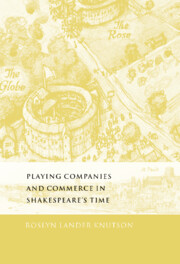Book contents
- Frontmatter
- Contents
- List of maps and tables
- Acknowledgements
- 1 Theatre history as personality
- 2 Players and company commerce
- 3 Playwrights, repertories, the book trade, and company commerce
- 4 Histrio-Mastix and company commerce
- 5 Hamlet and company commerce
- 6 Poetaster, Satiromastix, and company commerce
- 7 Conclusion: Hot Anger and company commerce
- Notes
- Bibliography
- Index
4 - Histrio-Mastix and company commerce
Published online by Cambridge University Press: 22 September 2009
- Frontmatter
- Contents
- List of maps and tables
- Acknowledgements
- 1 Theatre history as personality
- 2 Players and company commerce
- 3 Playwrights, repertories, the book trade, and company commerce
- 4 Histrio-Mastix and company commerce
- 5 Hamlet and company commerce
- 6 Poetaster, Satiromastix, and company commerce
- 7 Conclusion: Hot Anger and company commerce
- Notes
- Bibliography
- Index
Summary
True it is, that some bad Poems,
though not all, carry their Owners Marks about 'em.
There is some peculiar aukardness, false Grammar, imperfect Sense,
or at the least Obscurity; some Brand or other on this Buttock,
or that Ear, that 'tis notorious who are the Owners of the Cattel,
though they shou'd not Sign it with their Names.
John DrydenHistrio-Mastix is an important piece of the narrative of the War of the Theatres and therefore of old notions of commerce among the playing companies. It is most important if its author is John Marston and if it was performed at Paul's playhouse during the late summer or autumn of 1599. It is least important if its author is not Marston, its venue not a commercial playhouse, and its stage run not in the months of August through December of 1599. Whoever its author, Histrio-Mastix is no more important to commerce among the Elizabethan playing companies than the hundreds of plays in public and private playhouses, at Court, at the universities, in provincial city halls, at the Inns of Court, and in the banquet halls of noble houses – all sites where the appetite for playgoing was encouraged throughout England in Shakespeare's time. It is no more important to strategies of commerce than the dozens of plays that turn up in dramatic and non-dramatic texts by way of allusions.
- Type
- Chapter
- Information
- Playing Companies and Commerce in Shakespeare's Time , pp. 75 - 102Publisher: Cambridge University PressPrint publication year: 2001



